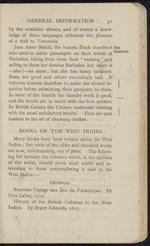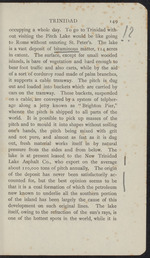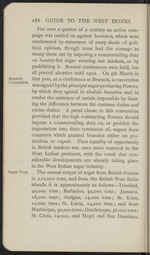| 1 |
 |
“...before submitting their garments to them.
In most of the islands the laundry work is good,
and the hotels are in touch with the best artistes.
In British Guiana the Chinese undertake washing 1
with the usual satisfactory results. They are past
masters in the art of cleansing clothes.
BOOKS ON THE WEST INDIES
Many books have been written about the West
Indies; but most of the older and standard works
are now, unfortunately, out of print. The follow-
ing list includes the volumes which, in the opinion
of the writer, should prove most useful and in-
teresting to those contemplating a visit to the
West Indies:—
General.
Nouveau Voyage aux lies ,de l’Amérique. By
Père Labat, 1722.
History of the British Colonies in the West
Indies. By Bryan Edwards, 1807....”
|
|
| 2 |
 |
“...the
world. It is possible to pick up masses of the
pitch and to mould it into shapes without soiling
one’s hands, the pitch being mixed with grit
and not pure, and almost as fast as it is dug
out, fresh material works itself in by natural
pressure from the sides and from below. The
lake is at present leased to the New Trinidad
Lake Asphalt Co., who export on the average
about 110,000 tons of pitch annually. The origin
of the deposit has never been satisfactorily ac-
counted for, but the best opinion seems to be
that it is a coal formation of which the petroleum
now known to underlie all the southern portion
of the island has been largely the cause of this
development on such original lines. The lake
itself, owing to the refraction of the sun’s rays, is
one of the hottest spots in the world, while it is...”
|
|
| 3 |
 |
“...Brussels
Convention.
Sugar Crop.
286 GUIDE TO THE WEST INDIES
For over a quarter of a century an active cam-
paign was carried on against bounties, which were
condemned by statesmen of every shade of poli-
tical opinion, though none had the courage to
stamp them out by imposing a countervailing duty
on bounty-fed sugar entering our markets, or by
prohibiting it. Several conferences were held, but
all proved abortive until 1902. On 5th March in
that year, at a conference at Brussels, a convention
was signed by the principal sugar-producing Powers,
by which they agreed to abolish bounties and to
render the existence of cartels impossible by limit-
ing the difference between the customs duties and
excise duties. A penal clause in this convention
provided that the high contracting Powers should
impose a countervailing duty on, or prohibit the
importation into their territories of, sugars from
countries which granted bounties either on pro-
duction or export. Thus equality of opportunity
in...”
|
|
